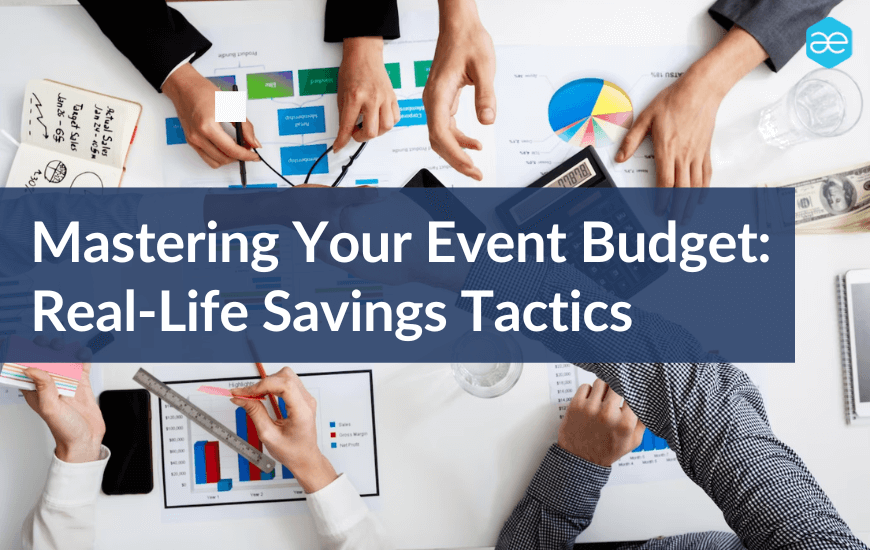Your event budget isn’t just numbers, but if we talk numbers, Event Spending will skyrocket by 83% in 2023.
That’s not just a vote of confidence in events, it also reflects the escalating costs. Inflation, surging material prices, labor expenses, and fuel costs are all making their presence felt.
So, before your budget (and Excel sheet) takes on a life of its own and goes boom, let’s make event budgeting as easy as ordering your favorite coffee. ?
Here’s what we have covered in the blog:
1. Understanding your event budget
2. Practical Steps for Creating a Well-Rounded Event Budget
3. How Do You Organize Your Event Budget? (Event budgeting template)
4. Real-life cost Savings Strategies and Tactics
Understanding Your Event Budget!

Event budgeting starts with defining the phase of the event, clarifying the event’s mission, and understanding the event’s target audience. This helps decide the event’s theme, venue, and event budgeting essential elements.
Whether you’re the event budget boss or tackling the numbers for a client, and this ? is your situation!

One thing’s certain – befriending the event budget is your ticket to freedom! And considering event budget essentials can help you plan ahead!
Event Budget Essentials
| Places to allocate your event budget | What it means for you |
|---|---|
| Venue | The central location for in-person or hybrid events. For virtual events, selecting the right platform is crucial. |
| Online Event Management and Ticketing | Your virtual handshake with attendees, handling everything from registration to metric tracking. (Your ticketing won’t cost anything with AllEvents) |
| AV Equipment | Lights, camera, action! Microphones, lighting, and sound systems are the unsung heroes of your event. |
| Speakers and Entertainment | Honoraria, guest speakers, and entertainers are the showstoppers of your event. |
| Marketing and Promotion | If you’ve got a marketing team, great. If not, don’t skip on getting the word out in every format. |
| Food and Beverages | Don’t leave your guests hungry—budget for a satisfying spread. |
| Staff and Vendors | A diverse cast of characters, from catering wizards to ushers. Keep an eye on those travel and accommodation expenses. |
| Travel and Accommodation | These expenses are non-negotiable for out-of-towners and in-between travels. |
| Miscellaneous | The catch-all category for unexpected surprises and everything else. |
Practical Steps for Creating a Well-Rounded Event Budget

1. Time and Money Saver Step: Define Your Event’s Financial Goals
Are you after big bucks, breaking even, or maybe willing to spend a little extra for a good cause? Having clear money goals guides your budget and keeps you from going off track.
Imagine going on a road trip with no destination in mind. You’d drive in circles, wasting time (and gas). Setting money goals is like knowing where you’re headed, and it can save you time and cash. It ensures that every financial choice you make fits your overall plan.
Here’s How to Set Money Goals:
Before you decide on money goals, know why you’re hosting the event. Is it to make cash, get the word out, make friends, or something else? Your event’s purpose guides your money decisions.
- Guess Your Expenses: Determine how much the event will cost. Think about everything, from the venue and food to marketing and backup plans.
- Predict Your Earnings: Consider all the ways you’ll make money, like ticket sales, sponsors, and selling stuff.
- Choose Your Profit: Calculate the expenditure per attendee and set the ticket price as you deem fit for your profit.
Setting money goals is a bit like baking a cake. You need the right ingredients and a clear recipe. So, let’s whip up those financial goals and create a budget that’s as sweet as pie! ??
2. Understanding Fixed and Variable Costs

Fixed costs are the steadfast heroes. They won’t budge like a rock in the storm. Think of venue rent and equipment fees. No matter how many people show up, these costs stay the same.
On the other hand, variable costs are the chameleons of expenses. They change with the wind, just like your mood on a Monday morning. These include things like catering, #swag items, and per-person registration costs. The more attendees, the more you pay. The fewer, the lighter your wallet.
To master your budget, you must tame both Fixed and Variable Costs. Keep the immovables in check, and watch the shape-shifters closely. The bigger the event, the more these variables play their tricks.
Pro tip: Always set aside a golden cushion – around 10% to 15% of your budget – for the unexpected. This safety net ensures that emergencies and budget curveballs won’t ruffle your feathers.
3. Discussing Various Sources Of Revenue For Events
- Ticket Sales: Consider selling event tickets online as golden nuggets. People pay to attend your event, and you collect their golden nuggets. Simple, right?
- Advertising: Imagine your event as a blockbuster movie. You can sell ad space just like they do at the cinema, but without the popcorn (unless you want to include that too).
- Sponsorships: This is where the big money comes in. Businesses want to be associated with your awesome event. They say, “Hey, we want to be part of the cool crowd too!” So, they pay you to sponsor your event.
- Merchandise: Create swag that people want to take home as a memory of your event. It’s like leaving breadcrumbs for them to find their way back to your next event.
- Donations: People who love what you’re doing might just drop some cash in your virtual tip jar. It’s like a street performer earning tips for their amazing show.
How to Secure Event Sponsorships for Budget Support:
- Know Your Value: Understand what makes your event special. Why would a company want to be associated with it? It’s like knowing why you’re the coolest kid on the block.
- Create Sponsorship Packages: Consider these as different levels of VIP access. The bigger the sponsorship, the fancier the perks. It’s like offering different flavors of ice cream – everyone gets what they want.
- Pitch Like a Pro: When approaching potential sponsors, be confident. It’s like asking your crush to the prom – you’re awesome, and they should know it!
- Show the ROI: Businesses want to know they’ll get a return on their investment. Explain how being part of your event will benefit them.
Want to sell more event tickets while saving your pocket? AllEvetns has an arsenal of marketing tools at a low cost!

4. Creating an Event Budget Proposal
This proposal is where you lay out all your money plans. It’s your financial GPS guiding you to success.
Why It’s Crucial: Imagine you’re asking your parents for permission to go to a concert. You don’t just say, “I want to go.” No, you present a well-thought-out case, like a lawyer in court. Your Event Budget Proposal is your case. It shows stakeholders (the decision-makers) that you’ve got your act together.
Key Ingredients of a Well-Structured Proposal:
- Detailed Budget: Lay out your expenses and income like a pro chef laying out ingredients. Show you’ve done your homework.
- Clear Objectives: State your event’s goals. Are you here to make money, break even, or have a good time? Make it crystal clear.
- Benefits for Stakeholders: Convince them that supporting your event will be as satisfying as a scoop of their favorite ice cream. Explain how it aligns with their interests and goals.
- Contingency Plans: Show you’re prepared for the unexpected. It’s like saying, “We’ve got an umbrella even if it doesn’t rain.”
- ROI Prediction: Explain how their investment will pay off. Make it sound as sweet as a dessert menu.
5. Managing Cash Flow
First, What’s Cash Flow? Imagine your event’s money as a river. Cash flow is how smoothly (or not-so-smoothly) that river flows. It’s not just about having cash; it’s about how it moves and grooves through your event’s journey.
Why Is It Crucial? Well, think of it as the heartbeat of your event. If the cash flow stops, your event’s heart might skip a beat (never a good sign)! So, managing it is like being a financial cardiologist.
Cash Flow Calculation Equation:
Cash Flow = (All Revenues – Uncollected Accounts Receivable) – Accounts Payable
- All Revenues: All the income a business earns, including sales, services, investments, and other sources of income.
- Uncollected Accounts Receivable: The portion of expected revenue but not yet received.
- Accounts Payable: The money organizers owe to their suppliers and creditors.
6. Keeping a Close Eye on Your Budget
Well, consider your budget as a pet dragon. It might fire your event’s treasure chest if you don’t watch it! Monitoring keeps your budget in check.
Regular Budget Check-Ins:
- Revenue: Keep an eye on the money flowing in. Ticket sales, sponsorships, and other income sources – make sure they’re on target.
- Expense: Hunt down those pesky expenses. Are they behaving or going rogue? Stay in control.
- Cash Flow Cop: Like a vigilant officer, ensure smooth cash flow. No unexpected bumps in the financial road!
- The ROI Ranger: Return on Investment, your trusty sidekick! Is your event bringing in the returns you expected? If not, it’s time to rethink your strategy.
7. Preparing for the Unexpected with a Contingency Plan
Life happens to us all, and it can happen to your event, too! But with a contingency plan, you can face it by saying, fine, just like this ?!
Here are Some Contingency Commandments:
- Expect the Unexpected: Like a surprise guest at a party, unexpected expenses can pop up. Be ready!
- Rainy Day Fund: It’s like an umbrella for your budget. Save some cash for those rainy days.
- Plan B Brigade: Prepare backup vendors, venues, and solutions—your event’s version of a superhero team.
- Realistic Rescue: Your contingency plan should be as real as your event planning. Over-the-top is for Hollywood, not budgets.
- The Relevance: Think of it as event insurance. When the unexpected happens, you’ll be the calm captain steering the ship through the storm.
How Do You Organize Your Event Budget?
A trusty spreadsheet does the trick for smaller events, while budgeting software tackles the heavy lifting for grand affairs. Divide your budget into expected and actual costs for easy tracking. You may use spreadsheet.com for event budgeting!
Real-Life Cost Savings Strategies and Tactics

1. Thoughtful Planning and In-depth Research
The foundation of success begins with careful planning and thorough research. Get to know your audience’s desires and expectations to allocate your budget wisely.
2. Strategic Cost Management
Your budget is your battlefield, and strategy is your weapon. Find ways to cut costs in various aspects, from venue selection to marketing, while maintaining the quality your attendees expect.
3. Prioritizing Key Event Elements
Divide and conquer your budget allocation. Ensure each key element of your event gets the financial attention it deserves. Balancing the budget is the name of the game.
4. Collaborate and Negotiate
Teamwork makes the dream work. Collaborate with your team and stakeholders to identify cost-saving opportunities. Successful collaborations can lead to significant savings.
5. Leveraging Technology for Efficiency
Technology is your friend. Explore platforms and tools that streamline event budgeting, saving you time and money in the process.
6. Events Go Green and Healthy
Sustainability doesn’t have to be expensive. Allocate your budget for eco-friendly practices, from working with green vendors to reducing waste, increasing energy efficiency, and promoting healthy catering.
7. Optimizing Staffing
Your team is your secret weapon. Maximize their efficiency by delegating tasks effectively and ensuring everyone is in the right role.
Final Words To Strategically Plan Event Budget
Remember these fundamental strategies as we draw the curtains on this discussion about event budgeting. Start with thorough audience understanding, handle costs wisely, prioritize key elements, collaborate for savings, make the most of technology, embrace sustainability, and optimize staffing.
The budget will already be identified for events that submit an RFP (request for proposals). From there, it’s a matter of working backward and determining the must-haves and the nice-to-haves.
With these guiding principles, you can craft successful events that resonate with your audience and maintain fiscal harmony. It’s your time in the spotlight, so go ahead and create #happening experiences! ?
Quick Answers
Why is understanding my event budget important?
Knowing your budget prevents financial surprises and keeps you in control.
What are the essential elements of an event budget?
Key elements include venue, online event management, AV equipment, speakers, marketing, food, staff, travel, and a miscellaneous category.
How do I set money goals for my event budget?
Consider your event’s purpose, estimate expenses, predict earnings, and choose your profit.
What’s the difference between fixed and variable costs in event budgeting?
Fixed costs stay constant, while variable costs change based on attendance.
How can I prepare for unexpected expenses with a contingency plan?
Expect the unexpected, have a rainy day fund, plan B brigade, realistic rescue, and see it as event insurance.
What tools can I use to organize my event budget?
Spreadsheets work for smaller events, while budgeting software helps with larger affairs.






